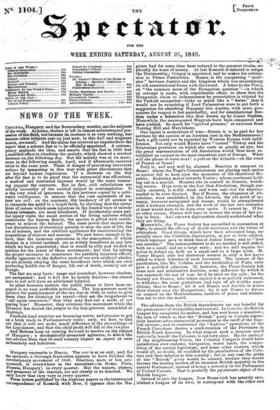Hungary succumbs to Russia. The war is at an end
i and, for the moment, a thorough frustration appears to have finished the revolutionary movement of 1848. Reaction, more or less pro- nounced, is everywhere in the ascendant—in Rome, Paris, Prussia, Hungary; in every quarter. But the nature, objects, and prospects of the reaction, are not clearly to be descried. We only know that they vary in every quarter. From letters published by the Austrian papers as the intercepted correspondence of Kossuth with Bem, it appears that the Ma- • - Byars had for some time been reduced to the greatest straits, es- Is
pecially for want of money. At last Kossuth is induced to resign the Dictatorship; Giirgey is appointed, and he makes his submis- sion to Prince Paskiewicz. Russia is the conquering. " medi- ator" between Austria and the kingdom which was maintaining its old constitutional forms with the sword. A letter in the Times, on " the common sense of the Hungarian question "—in which an attempt is made, with considerable effect, to show that the Hungarian claim to independence by prescription is vitiated by the Turkish occupation—looks so much like a " feeler," that it would not be surprising if Lord Palmerston were to put forth a suggestion for absorbing Hungary into Austria, with some gua- rantees for respect to her nationality, and for constitutional free- dom under a federation like that drawn up by Count Stadion. Meanwhile, the unconquered Magyars have been conquered and have yielded. So much for "spirited protests," or succours from Notting Hill and Marylebone. One report is momentous if true—Russia is to be paid for her
services by the cession of an Austrian port in the Mediterranean I. Such a gift could not be regarded by Western Europe with indif- ference. Not only would Russia have " turned " Turkey and the Sclavonian provinces on which she casts so greedy an eye, but the great representative of old Absolutism would thus have es- tablished an outpost in the most important part of Europe. What will she please to have next? a port on the Atlantic—on the coast of France or Spain? Italy is, and may well be, alarmed. Reaction is rampant in Rome ; where the Pope's Commissioners are playing such antics as cannot fail to keep open the memories of the shortlived Re- public. Radetzky moves towards Venice ; whose continued hold- ing out is a marvel. Mazzini sits in council at Geneva, watch- ing events. Hope rests in the fact that Absolutism, though par- tially restored, is really weak and worn out—too far superan- nuated to be even discreet. But if Russia, the champion of Ab- solutism, were established in the Adriatic, the old spirit of ty- ranny, however antiquated and insane, would be strengthened with a barbaric strength, and the work of the last two centuries at least would have to be done over again. It cannot be. If for no other reason, France will have to retrace the steps of her po- licy in Italy. And ourown diplomatists should understand what they are doing.
Meanwhile, the Peace Society has assembled in convention at Pais, to preach the efficacy of moral resistance and the virtue of arbitration. Good things, which have been advocated long, es- pecially since the Christian dispensation, as yet so little obeyed, which enjoined men to think less of Judaic forms, and to " love one another." The commandment to do no murder is still defied, both on a small and on a large scale ; and we still require the police to defend us both on a small and on a large scale. M. Victor Hugo's able but rhetorical sermon is only a few pages added to whole libraries of such literature. The acutest of the pacificators, like Mr. Cobden and the Archbishop of Paris, only give a qualified adhesion. If, however, the Peace Society has some new and substantive doctrine, some influence by which it can supersede the use of war, let it be tried on the spot: let the Society ask France, into whose capital it is so politely welcomed, to withdraw the most gratuitous and vain of all warlike expe- ditions, that to Rome ; let it ask Russia and Austria to waive their victory over the Hungarians ; let it ask Russia to forego an outpost on the Mediterranean, needless if peace and arbitra- tion are to rule the world.


























